| Srl | Item |
| 1 |
ID:
092881
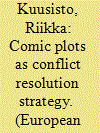

|
|
|
|
|
| Publication |
2009.
|
| Summary/Abstract |
Recently, the 'war stories' of the leaders of the major Western powers - the United States, Britain and France - have adhered to two major plots: the heroic epic or the sad tragedy. The heroic script defines and explains conflicts in which the Western powers have wished to play an active role: the Persian Gulf (1990-1), Kosovo (1999) and the current war against terrorism. The tragic plot has been employed when they have ruled out forceful outside intervention, like in Bosnia (1992-5) and Rwanda (1994). Both scripts are highly problematic conflict resolution approaches: they point to black-and-white, aggressive denouements. An alternative is the comic plot: a story traditionally used in ordinary disagreements among friends, problems with 'small foes' and disputes with important rivals. Adopting a comic framework for most of the conflicts in the world would give the Western leaders more room to negotiate, to try out new ideas and to back down on unsuccessful strategies.
|
|
|
|
|
|
|
|
|
|
|
|
|
|
|
|
| 2 |
ID:
092883
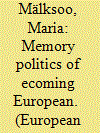

|
|
|
|
|
| Publication |
2009.
|
| Summary/Abstract |
The situation in collective memory studies that share a nexus with the discipline of International Relations (IR) is currently reflective of the traditionally West-centric writing of European history. This order of things has become increasingly challenged after the eastern enlargement of the European Union (EU). This article examines Poland's and the Baltics' recent attempts to enlarge the mnemonic vision of 'the united Europe' by placing their 'subaltern pasts' in contest with the conventionally Western European-bent understanding of the consequences of World War II in Europe. I argue that their endeavours to wrench the 'European mnemonical map' apart in order to become more congruent with the different historical experiences within the enlarged EU encapsulate the curious trademark of Polish and Baltic post-Cold War politics of becoming European: their combination of simultaneously seeking recognition from and resisting the hegemonic 'core European' narrative of what 'Europe' is all about.
|
|
|
|
|
|
|
|
|
|
|
|
|
|
|
|
| 3 |
ID:
092880
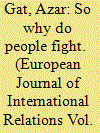

|
|
|
|
|
| Publication |
2009.
|
| Summary/Abstract |
The causes of war remain a strangely obscure subject in the discipline of International Relations. Although the subject is of cardinal significance, theories of International Relations address it only obliquely, and most scholars in the field recognize the lacuna only when their attention is drawn to it. While people have a good idea of the aims that may motivate states to go to war, an attempt at a strict definition of them is widely regarded as futile. This article seeks to show how the various causes of violence and war all come together and are explained within an integrated human motivational complex, shaped by evolution and natural selection. These interconnected causes of fighting - some of them confusedly singled out by various schools in IR theory, most notably within realism - include competition over resources and reproduction, the ensuing quest for dominance, the security dilemma and other prisoner's dilemmas that emanate from the competition, kinship, identity, and ideas.
|
|
|
|
|
|
|
|
|
|
|
|
|
|
|
|
| 4 |
ID:
092884
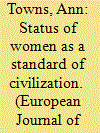

|
|
|
|
|
| Publication |
2009.
|
| Summary/Abstract |
This article focuses on the status of women as a standard of civilization by examining its emergence in the 19th-century European 'society of civilized states.' More specifically, the article centers on expectations about the proper political role of women and how these operated as a standard to distinguish 'civilized' states from other societies. The article shows that the political exclusion of women - not their inclusion - became expected behavior for 'advanced' societies at this time. To statesmen and social scientists alike, evidence from 'savage' society and an uncivilized European past demonstrated that women could not contribute to human advancement if given a political role. To arrive at this claim, the article examines the understandings that had come into place to make the political exclusion of women possible and reasonable for European and European settler states.
|
|
|
|
|
|
|
|
|
|
|
|
|
|
|
|
| 5 |
ID:
092882
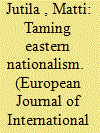

|
|
|
|
|
| Publication |
2009.
|
| Summary/Abstract |
This article uses the logic of explanatory emancipation to criticize post-Cold War minority politics. The main argument is that the ideational background of the double standards of minority protection originates from a contested dichotomy of nationalism that divides nationalisms into Eastern ethnic/malignant nationalism and Western civic/benign nationalism. After presenting the theoretical tradition of the 'Kohn dichotomy', the article traces its use in post-Cold War academic and official policy papers. Through intertextual analysis, this article shows how the old theoretical tradition was recycled into a new context to dispel post-Cold War confusion. This article presents a Critical Realist view on how ideas and theories can be treated as parts of the causal analysis of social practices. With explicitly causal language, identifying possible forms for emancipatory action is easier than with constitutive analyses.
|
|
|
|
|
|
|
|
|
|
|
|
|
|
|
|
| 6 |
ID:
092885


|
|
|
|
|
| Publication |
2009.
|
| Summary/Abstract |
Transnational rule-making organizations have proliferated in the area of sustainability politics. In this article, we explore why these organizations share a set of core features that appear overly costly at first sight. We argue that norms that evolved out of the social interaction among transnational rule-making organizations account for this phenomenon. Thus, in the early 1990s, an organizational field of transnational rule-making has gradually developed in the field of environmental politics. Responding to a broader social discourse about global governance that stressed a need for innovative forms of cooperation among different societal sectors, this organizational field gained in legitimacy and strength. A set of commonly accepted core norms, the increasing density of interaction among the field's members, and the success and legitimacy ascribed to the field's key players by the outside world helped to solidify the organizational field until it eventually developed a 'life of its own'.
|
|
|
|
|
|
|
|
|
|
|
|
|
|
|
|